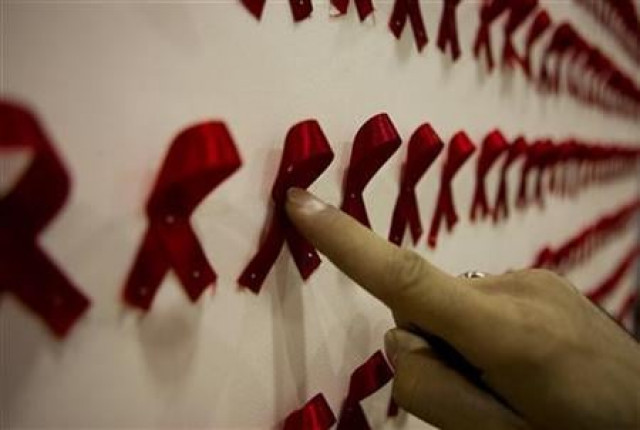'Pakistan has 165,000 HIV/AIDS patients, less than 15% registered'
Health ministry reply in NA says 24,331 registered patients in Pakistan; highest number in Punjab at 12,202

PHOTO: REUTERS
The figures were submitted as a written response during Friday's session of the National Assembly chaired by Deputy Speaker Qasim Khan Suri.
As per the ministry's data, the number of registered HIV-infected people in the country is 24,331 - around 15 percent and a mere fraction of the total number across Pakistan.
The ministry's records show Punjab as having the highest number - 12,202 - of people with HIV. Sindh stands second with 6,867 registered patients, while there are 2,424 registered patients in Islamabad and 2,004 in Khyber Pakhtunkhwa.
The lowest figure for registered HIV/AIDS patients, 834, was reported in Balochistan.
Apart from the submission of the health ministry's reply, there could be no discussion on the matter owing to a lack of quorum, pointed out by Sheikh Fayyazuddin of the Pakistan Muslim League - Nawaz (PML-N).
Deputy Speaker Suri ordered a count of the members present and then suspended proceedings. A recount was conducted after a while and the session was then adjourned till August 5.
The silent spread of HIV
The National AIDS Control Programme (NACP) had also released figures earlier this year, reporting a total of 1,65,000 HIV-infected people in Pakistan.
According to the NACP, Punjab has 75,000 HIV/AIDS cases, followed by 60,000 in Sindh, 16,322 in Khyber Pakhtunkhwa, 5,275 in Balochistan and 6,675 in Islamabad. In addition, about 2,500 HIV/AIDS patients belong to Azad Jammu and Kashmir and Gilgit-Baltistan.
The number of registered HIV/AIDS patients was lower in the NACP data at 23,000, a figure the NACP has been quoting for the past five years.
The NACP report said a total of 18,220 men, 4,170 women, 564 boys, 426 girls and 379 transgendered individuals have been registered as HIV/AIDS patients.
The NACP data showed that more than 1,000 jailed prisoners all over the country are HIV/AIDS patients. The virus was found in 480 prisoners in Punjab, 296 prisoners in Sindh, 181 prisoners in Balochistan and 56 prisoners in K-P.
In a written reply submitted earlier this year to the National Assembly, the health ministry maintained that immediate measures were being taken for HIV patients, including the provision of medicines and steps to stop the disease from being communicated from parents to their young children.
The ministry said it had established 35 centres throughout the country for HIV/AIDS treatment. It also highlighted negligence during blood transfusion and the use of contaminated syringes by drug users as contributing factors for the spread of the disease.
The World Health Organisation also recently warned that Pakistan is registering approximately 20,000 new HIV infections annually – the highest rate of increase among all countries in the region.



















COMMENTS
Comments are moderated and generally will be posted if they are on-topic and not abusive.
For more information, please see our Comments FAQ